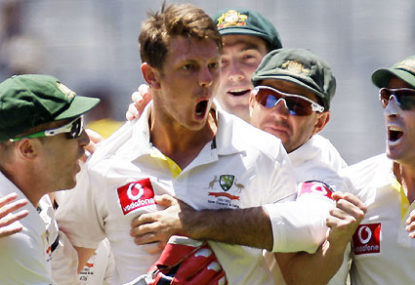Christopher Currie
new author
Roar Rookie

People who find out I love sport are often surprised, especially considering much of my professional life revolves around being a bespectacled, latte-sipping author and stock buyer for an independent bookshop.
But believe me, I have wasted enough hours watching Test matches, one dayers and even Twenty20s to be considered a true cricket tragic.
Recently, my two worlds collided when Steve Waugh announced he would be self-publishing his new book ‘The Meaning of Luck’ and distributing it exclusively through discount department store Big W.
There was a predictable and understandable backlash against this decision, not only from independent booksellers (who have been fighting the buying power of discount chains for years), but publishers themselves, many of whom have spent significant time and money editing, printing, promoting (and in many cases, writing) Waugh’s previous books.
While I disagree with Waugh’s decision, it does reflect the character and instinct he showed on the field all through his decorated career: a determined, hard-nosed philosophy that put success first and popularity last.
Moreover, it got me thinking about the current Australian squad, and what sort of books they would write, based entirely on their performances in the baggy green.
Shane Watson
Upon publication of his book, calls immediately for a review. Every request is turned down, as it quickly becomes clear he actually stopped writing somewhere between pages 30 and 40, when his typewriter broke down.
Dave Warner
Embraces the Jamie Oliver philosophy, with his inspirational memoir about his Test career, ’15-Minute Innings’. Readers unimpressed with the ‘touch and feel’ moustache on the front cover.
Phil Hughes
Tries writer’s block, but the ideas still squirt off the edge to second slip.
Ashton Agar
Hailed as a ‘modern Harper Lee’, but mainly because he produces a great first effort and is never heard from again.
Mitchell Starc
Heavily criticised for plagiarising the works of celebrated far-left (and then far-right) essayist Mitchell Johnson.
James Pattinson
Composes the steamy romance ‘Stress Fracture of the Heart”, featuring main protagonist ‘Jimmy Patterson’.
Nathan Lyon
Not wanting to be in any way aided by his fame, Lyon writes the first of a planned series of detective novels under the pseudonym ‘Nathan Hauritz’.
Ryan Harris
Spends all of his publishing advance learning to read, misses manuscript delivery deadline.
Peter Siddle
Has a massive global hit with his thriller: ‘The Guy with the Southern Cross Tattoo You Can Clearly See Through His Cricket Whites and That He’s Clearly Going to Regret When He’s Slightly Older’.
Chris Rogers
Pens an incredibly accurate eyewitness account of the First World War.
Michael Clarke
Releases exclusive pictures of his book (on the back of a horse, on a beach, draped in fine silk), exclusively to Woman’s Day, which everyone then makes fun of.
Jackson Bird
Actually writes an incisive, entertaining sporting biography, but just has too many options for the requisite pun in the title and shreds the manuscript in frustration.
Steve Smith
Completes a trilogy of bestselling young adult novels set in a post-apocalyptic future where a shadowy central agency exercises complete control over a collection of young, ego-driven performers who must battle to the death in a televised contest, known as ‘The Indian Premier League’.
Brad Haddin
Despite completing his manuscript, it is rejected by all major publishers because all wicketkeeping biographies are destined to exist in the shadow of Tim Zoehrer’s haunting masterpiece, ‘The Gloves Are Off’.
Matthew Wade
After one too many paid ‘masterclasses’ with author of ‘Segway Riding for Dummies’ Ian Healy, Wade drinks himself into a Hemingwayesque stupor and passes away.
James Faulkner
Taking inspiration from his literary namesake, Faulkner constructs complex, almost surreal structures of form and experiment. And after he’s done his hair he also writes a book.
Ed Cowan
Exempt because he has already written a five-book analysis on the politics of the soul based on the themes raised in the letters of Gustave Flaubert.
Usman Khawaja
Writes a sweeping saga described as ‘a hit’ by everyone except Kumar Dharmasena.